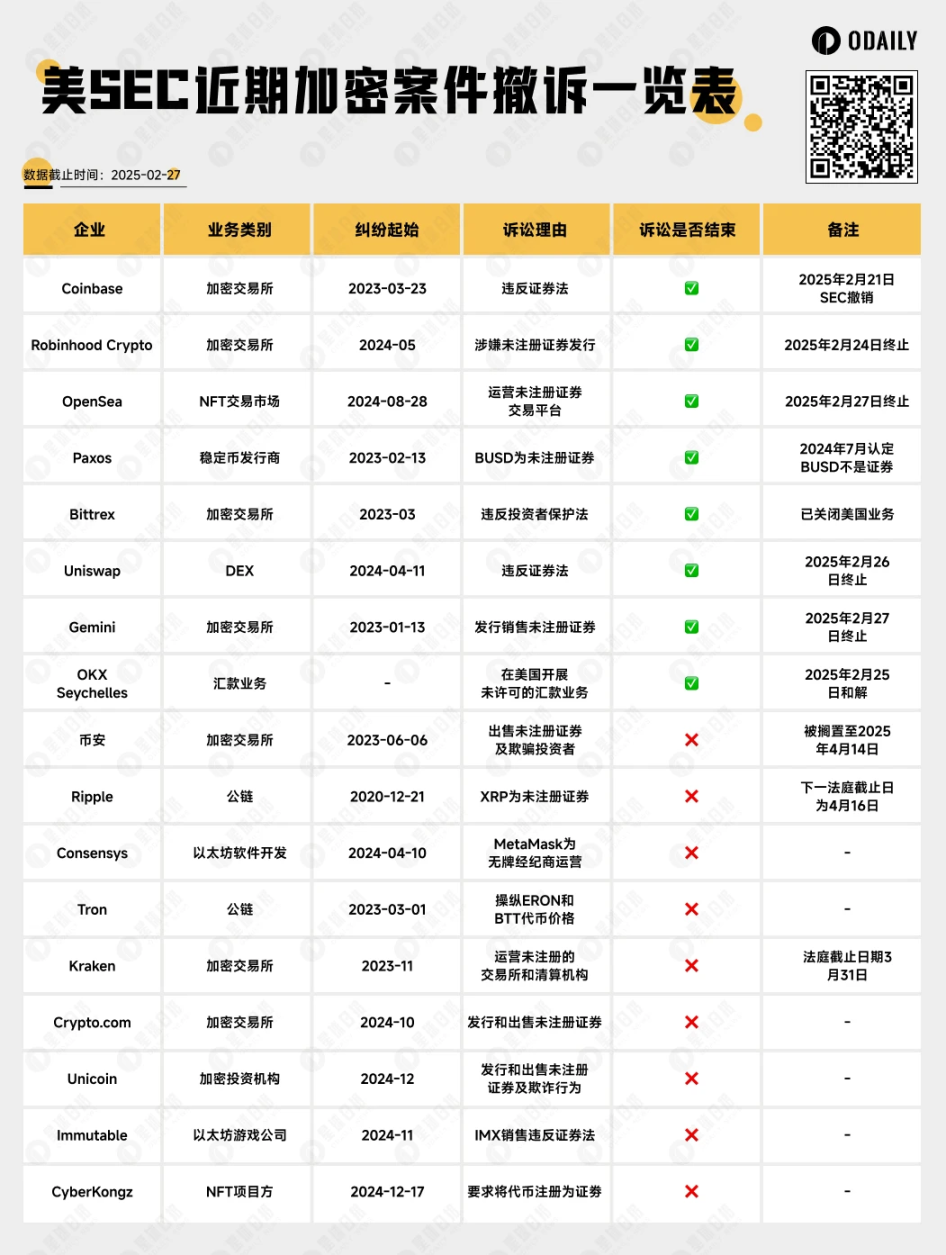Author: Golem, Odaily Planet Daily
Although the recent crypto market has shown signs of decline, with Bitcoin falling by more than 10% in the past seven days and its market value once falling out of the top ten global assets, there is a trend of improvement in crypto regulation.

Long before Trump officially took office, crypto advocacy organizations such as the U.S. Chamber of Digital Commerce listed the important events of the new SEC's "first day" as launching a review of all existing crypto-related investigations, Wells notices, and ongoing litigation cases, and seeking to suspend cases that do not involve actual fraud or investor harm.
On January 20, 2025, Gary Gensler, who had been in charge of the US SEC for four years, officially stepped down. Mark Uyeda has served as the acting chairman of the US SEC ever since. In just one month, the new US SEC has fulfilled its promise and changed Gary Gensler's tough regulatory attitude towards crypto companies during his tenure. First, a number of crypto lawsuits were settled and withdrawn. Odaily Planet Daily organized it into the following figure:

Crypto companies: Years of persistence finally bring light
Many crypto companies have been engaged in a years-long "war" with the U.S. SEC before being settled and the lawsuits were dropped.
The dispute between Coinbase and the US SEC can be traced back to 2021. In September 2021, the US SEC issued a Wells Notice against Coinbase's lending business Coinbase Lend (an informal reminder issued by the US SEC to US listed companies before filing a civil lawsuit. Listed companies that received the notice can communicate and negotiate with the SEC before receiving a formal lawsuit). At that time, Coinbase did not choose to confront the US SEC, but announced the cancellation of its upcoming crypto lending project plan.
But in March 2023, the US SEC again sent a Wells notice to Coinbase, warning that the company may have violated US securities laws, focusing on pledge services and asset listings. Faced with this lawsuit, Coinbase did not choose to back down. Coinbase CEO Brian Armstrong said at the time, "Coinbase has to prepare for a years-long court battle with the US SEC, and even if the situation worsens, it will consider making more investments overseas, including moving from the United States to other places."
Other exchanges that share the same tough stance as Coinbase include Uniswap and OpenSea.
In April 2024, Uniswap received a Wells Notice from the U.S. SEC and made it clear that it would "fight back" to the end: "We must fight U.S. government agencies to protect our company and industry. This fight will last for years and may go all the way to the Supreme Court. The future of fintech and our industry is at stake."
In August of the same year, OpenSea also received a notice from the U.S. SEC against Wells, accusing it of operating as an unregistered securities trading platform and attempting to classify NFTs as securities. OpenSea also chose to stand up and fight for the industry, and in order to help ensure that creators can continue to create without fear, OpenSea then provided $5 million to pay legal fees for NFT artists and developers who also received the Wells notice.
In fact, it is not easy to fight a lawsuit with the US SEC. As Hayden Adams, co-founder of Uniswap, said in response to the US SEC's abandonment of the investigation into Uniswap on February 26, "The SEC's previous investigation lasted three years, wasted a lot of time and millions of dollars, and had a significant impact on the company."
The human, material and financial pressures that must be borne in litigation are not something that ordinary companies can bear. Some crypto companies have not survived to this good era of redress.
For example, the stablecoin issuer Paxos, which jointly issued the stablecoin BUSD with Binance in February 2023, received a Wells notice from the U.S. SEC, accusing BUSD of being an unregistered security. On the same day, Paxos was forced to stop issuing BUSD under pressure from the New York State Department of Financial Services. Although Paxos had also protested that BUSD was not a "security" and would sue the SEC, it ultimately failed to withstand the pressure, and Binance also announced in November 2023 that it would gradually remove BUSD. What is dramatic is that in July 2024, the SEC gave up its investigation into Paxos and determined that BUSD was not a security.
Crypto regulatory spring has arrived
The two most important promises that the crypto market needs Trump to fulfill when he takes office are to establish a strategic reserve of Bitcoin and to reverse the US SEC's regulatory attitude towards crypto. Although the progress of the approval of the strategic reserve of Bitcoin in various states is not optimistic, the US SEC's attitude towards crypto has visibly improved.
The US SEC’s decision to abandon the lawsuit has already set an example. After the lawsuits against Coinbase and Robinhood were dropped, exchanges such as Binance and Kraken may see a turnaround, because the lawsuits against these platforms are based on the same regulatory logic as the Coinbase case. At the same time, according to Fox Business reporter Eleanor Terrett, given the US SEC’s recent focus on the pledge business, the agency may re-examine the lawsuit it filed last year against ConsenSys over its MetaMask pledge service.
The US SEC's batch withdrawal of lawsuits will also benefit tokens that were once considered securities, including BNB, SOL, ADA, etc., and may even usher in a new round of "policy bulls." The spring of crypto regulation has arrived, and the crypto industry is one step closer to gaining recognition from the traditional world.





